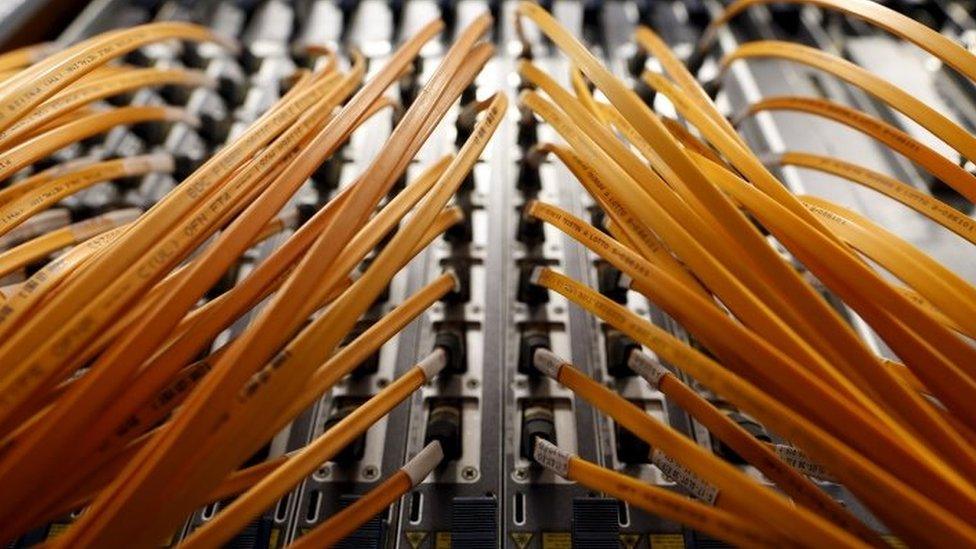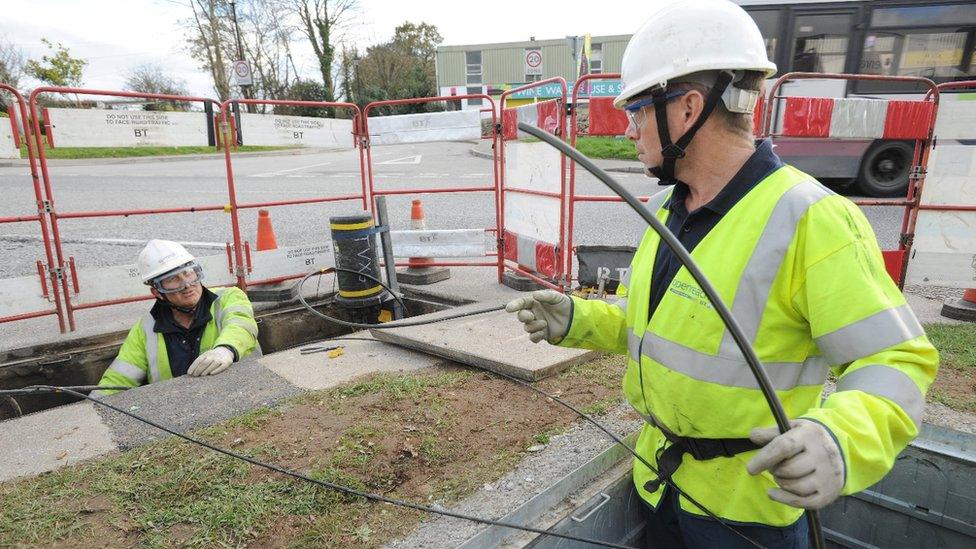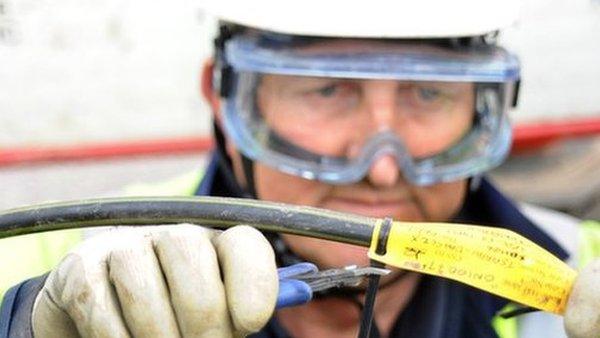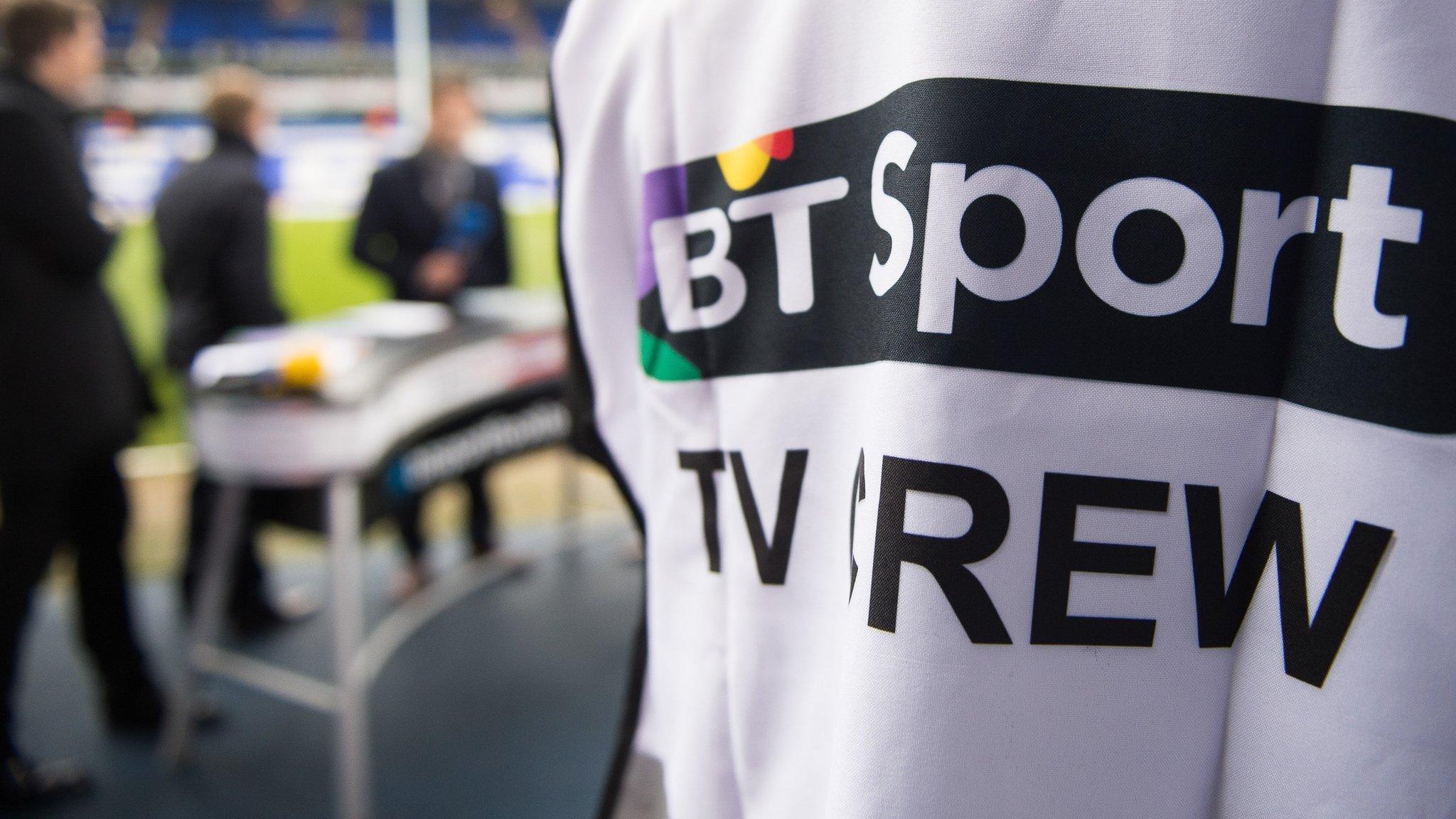Ultra-fast broadband fund launched by UK government
- Published
- comments
Digital Skills Minister Matt Hancock told BBC Radio 4's Today programme about plans to spend on ultra-fast broadband
The government has formally launched a £400m fund to boost investment in "full-fibre" broadband.
The aim is to offer speeds of up to 1Gbps to households and businesses.
Rather than relying on copper cables to connect them to roadside cabinets, fibre-optic cables will run directly to their properties.
The plan, announced by the chancellor in November, has been called, external "a drop in the ocean" compared with what will be needed to make "full fibre" the norm.
Although many households and organisations do not currently need 1Gbps speeds - consumers need only 3Mbps to watch the BBC iPlayer in high definition, for example - the idea is to provide a "future-proof" solution.
Private money
The Digital Infrastructure Investment Fund's goal is to boost the number of properties with access to "ultra-fast" fibre-to-the-property broadband over the next four years.
At present, "full fibre" is available to only about one million premises, representing about 2% penetration. That contrasts with Spain, where the figure is 80%, external.
The government is tapping private investors to bring the total sum to £1bn, and the money will be managed and invested by two fund managers, external - Amber Infrastructure, and M&G Investments, which is part of Prudential.

At present, many UK properties offered fibre connections still rely on copper cables for the "last leg" of the journey
"Traditionally in Britain, full fibre has been difficult to finance because the industry is relatively young and a lack of certainty around future demand makes investment hard to secure," the Treasury said in a press release, external.
"This has held back alternative providers from entering the market, and consumers have been left with limited choice, which, in turn, has restricted their ability to benefit from this latest technology."
A spokeswoman for the Treasury told the BBC that while no company was excluded from seeking access to the cash, the fund was designed to be attractive to small network builders, which found it harder to attract capital than BT's Openreach division or Virgin Media would.
But the Labour Party was dismissive of the news.
"This is yet another re-announcement from a Government that just isn't keeping pace with developments in the industry," commented Tom Watson MP.
"No matter how many times they announce this fund the reality remains that we are on track to have just 7% full fibre coverage by 2020. It's not good enough and it'll leave Britain in the slow lane for years to come."
One industry watcher, however, said the initiative was "important" but needed to be tempered with realism.
"Consumer broadband is cheap for us as consumers because we share it at some point in the network," said Andrew Ferguson, of the ThinkBroadband news site.
"So, while you might have a dedicated fibre for yourself through to a place that may be 10 or 20 miles away, you will still at that point be contending for access with other people.
"That may mean that at peak times, even with a theoretical 1Gbps connection, you won't be getting speeds that hit that target."
Super-fast v ultra-fast
Until now, the UK government's focus has been to deliver "super-fast" broadband speeds - meaning 24Mbps or more.

Openreach aims to provide 12 million properties speeds of 100Mbps or faster by 2020
It has pledged that 95% of UK properties will have this by the end of this year and 100% will have at least 10Mbps by the end of 2020.
BT's telecoms infrastructure division, Openreach, has said it believes two million premises will have access to "full fibre" by the end of 2020.
But it aims to provide speeds of up to 330Mbps to a further 10 million premises via a copper-based technology known as G.fast by the same date.
G.fast's advantage is that it is cheaper to install as it does not require roads and pavements to be dug up since it can piggyback on existing cables.
However, the service can become degraded in wet weather conditions.

Analysis: Rory Cellan-Jones, technology correspondent

In the past couple of years, the way ministers talk about broadband has undergone a radical change.
Not long ago, they used to bat away criticism about the UK relying on old copper-based networks and boast that we had the most competitive broadband market in Europe.
Now, every time they open their mouths the words "full fibre" emerge - copper is suddenly not up to the job, and a 21st-Century network means fibre connections right into every home and office.
The trouble is, £400m is just not going to pay for that. Yes, both BT Openreach and nimbler rivals are now investing more into rolling out fibre to the premises.
But with only 2% of homes having access to that kind of gold-plated connection, reaching the other 98% is going to take a lot of money and time.
What's more, it will need an army of construction workers, and the companies digging up the streets are already worrying about where they will come from post-Brexit.
That all means that there will be pressure for more taxpayer funds, with critics pointing at other infrastructure projects such as HS2 and asking why they are a higher priority.
But there is also likely to be a growing realisation that full fibre for everyone won't happen in a hurry.
That means for many the dreaded copper - albeit through G.fast - is likely to be the route to faster broadband for years to come.
But don't expect ministers to mention that.

New name
The government has also signalled its commitment to technological matters by renaming one of its departments.
What was the Department for Culture, Media and Sport now becomes the Department for Digital, Culture, Media and Sport.
However, it intends to retain the same acronym, DCMS, as before.
"Half of its policy and delivery work now covers the digital sectors , external- telecommunications, data protection, internet safety, cyber-skills and parts of media and the creative industries," said the minister, Karen Bradley.
- Published3 July 2017

- Published22 November 2016

- Published5 May 2016
